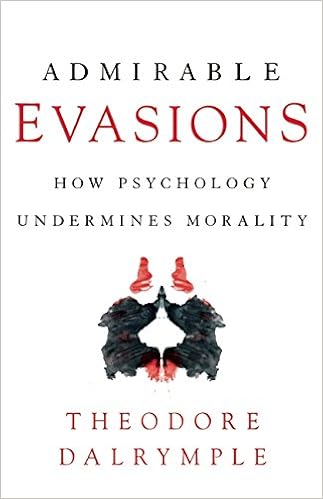It was a little bit of a thrill when I found that Dalrymple (Daniels) had published another book. The man is nothing if not prolific. I first came across him in 2005 when I read his book "Life at the Bottom", then the superlative "Our Culture: or what is left of it". Finally, "Spoilt Rotten: The toxic cult of sentimentality", this is the seminal book on sentimentality and it's affect on Western Culture. When you live holding a minority worldview, it is always exhilarating to read Dalrymple's work. It washes you clean from the daily grind and refocuses you on thinking through issues rather than the sentimentalism of today's secular left. Since then I have tried to follow his essays online. There is a tremendously insightful essay on tattoos dated from the year 2000, it is even more prescient today than when written.
Daniels is a doctor, but has fostered a love of literature and philosophy since he was pressured into a medical career. For many years he worked as a prison doctor, indeed a psychologist. He is well travelled, well read, well though of and can he write!
Well, 'Admirable Evasions: How psychology undermines morality' is a fascinating book. I jumped at the chance to read it and read it quickly. I digested it in the week leading up to a seminar that I went on hosted by the 'Science of Learning' centre at Melbourne University. This seminar was on Neuroscience, Cognitive Psychology and Education. We currently have undergone a wholesale change in attitude at my workplace where 'Positive Psychology' and it's mystical corollary 'Mindfulness' have entered the sway and been uncritically and universally accepted as good things. I have been somewhat skeptical about this change and have been glad that it has not directly affected me. This is not being unduly critical of my workplace - this stuff has been accepted across Education nationwide. This is the current fad! Everyone is a part of it to greater or lesser extent. Along with this, I was interested to read that the Neuroscientist present at the conference was a student of Stephen Pinker. I assumed that he would be in Pinker's mould, an adamant Monist, physicalist and hostile to any form of dualism. I signed up thinking that I may be an unwelcome agitator.
To my surprise, the opening salvo was a stern denouncement of the way Neuroscience has entered Education. They openly mocked and decried the folly of the many programmes that are introduced into schools as the next best thing and how neuroscience adds credibility to Educative programmes that are not warranted. Further, they stood by the statement that Neuroscience has nothing to offer Education. The presenters were of the belief that Neuroscience can only inform Educators when filtered through the medium of cognitive psychology - a thesis in which they have since published, and one with which I concur. Moreover, the Neuroscientist turned out to be a duelist and smiled when I looked at him astonished. He said "Pinker is a lovely guy and has been so supportive of me, however, when he opens his mouth, I just can't bring myself to believe that stuff." I was stunned.
Dalrymple's book prompted questions that I did't have to defend - they were largely agreed with. His assault on Modern Psychology starts immediately:
"Psychology is not a key to self-understanding, but a cultural barrier to such understanding as we can achieve; but it is my belief that we shall never be able entirely to pluck out the heart of our mystery. Of this I am glad rather than sorry."
His distain for the effect upon society is clear:
"We owe incomparably more to improved sewers than to psychology."He is invariably in tune with the Utopian nature of the influence of Neurology and psychology in our modern world and compares it with the enlightenment view of Liberal Democracy.
"Before long, if there is sufficient research funding, there will be no more puzzles and no unpleasant surprises, no agonizing dilemmas in human existence; the question of the good life will have been settled once and for all, indubitably and scientifically, without the necessity of endless and unprovable metaphysical speculations ... History will come to an end, this time not by virtue of the triumph of liberal democracy throughout the world, but by that of the triumph of psychology and neuroscience. Man will no longer pass on misery to Man, as in Larkin’s poem; he will pass on knowledge instead, knowledge and wisdom being of course by that stage coterminous. Indeed, knowledge will secrete wisdom as the liver secretes bile."Dalrymple really resonates with me here - his declaration at this point is, "I don’t believe it, and I’m not sure that I would want to live in such a world if it were true." I wholeheartedly agree!
Dalrymple then proceeds to systematically undo Freud, Psychoanalysts, Behaviourism and the ultra-modern penchant for Neurology.
"That the latest neuroscience as a means of humanity understanding itself has been grossly oversold scarcely needs proof. It offers the illusion of understanding rather than understanding itself."Self-understanding is best found in literature, Dalrymple argues - he says that psychology has not advanced human understanding beyond Shakespeare (the title of the book is taken from King Lear).
"...psychology has contributed nothing to human self-understanding; rather the reverse: for by coming between a man and what Doctor Johnson called “the motions of his own mind,” it acts as an obstacle to genuine (though often painful) self-examination."
As usual, Dalrymple is right. However, our society will not heed the call, but plough on its shallow way of carving out the coming dystopia - where the search for Utopia always ends up.
5 Stars - I'd give it six if I could. Must read.
